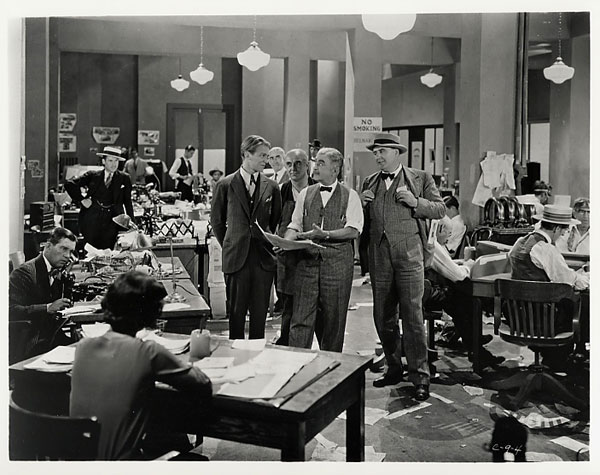
In the middle of the Times city room in The Power of the Press (Columbia Pictures, 1928), the city editor (Robert Edison) congratulates cub reporter Clem Rogers (Douglas Fairbanks Jr.) for getting his first page-one story as the more seasoned reporters gripe that it was all beginner's luck.
Sometimes the news about the news is the best news.
In the NYTimes today we learn about the formation of a well-funded and independent, non-profit group of investigative reporters who will give away their work to individual news organizations, those in which its work will "make the strongest impression". Beginning early next year Pro Publica will operate out of a newsroom in New York City with 24 journalists and a staff of about a dozen more on an annual budget of $10 million.
[Paul E. Steiger, previously top editor of The Wall Street Journal and soon to be Pro Publicas president and editor-in-chief] said he envisions a mix of accomplished reporters and editors, including some hired from major publications, and talented people with only a few years experience, so that the group will become a training ground for investigative reporters. He would not say specifically where he is shopping for talent, but did not rule out The Journal.I don't see how the project could fail. Both commercial and non-profit news organizations are cutting costs and neglecting the kind of journalism which will be Pro Publica's meat and potatoes. If one outlet declines to pick up the coverage they offer, another will. At the very least the one which turned down the story will be asked why it isn't covering it. And there's no reason why this thing would have to be confined to the print media.
Mr. Steiger said that relationships with publications could be tricky, requiring the flexibility to make each comfortable.Did I mention that the the plan is to do "long-term projects, uncovering misdeeds in government, business and organizations". Quoting Steiger, describing how Pro Publica hopes to fill a vacuum in almost all current news coverage: It is the deep-dive stuff and the aggressive follow-up that is most challenged in the budget process".In most cases, he said, Pro Publica will appeal to a newspaper or magazine while a project is under way, to gauge interest and how much oversight the publication wants. In others, he said, his group might present more or less finished products to other outlets.
If Pro Publica and a publication cannot agree on how to approach a topic, or what can be written about it, he said, his group will look for another outlet, or publish its reporting on its own Web site.
The money comes from Herbert M. and Marion O. Sandler (California mortgage lending, savings and loans), described as major donors to the Democratic Party and critics of President Bush.
Mr. Sandler [who will serve as chairman of the group] said his interest in investigative journalism has been abetted by friendships with reporters in the field.Old-school progressive journalism breathes again, paradoxically funded by a pair of "financial honchos" and directed by a successful Wall Street Journal editor. This is not exactly "Mr. Smith Goes to Washington", but then nothing ever was.Both my father and my older brother always focused on the underdog, justice, ethics, whats right, Mr. Sandler said. All of my life Ive been driven crazy whenever I encounter corruption, malfeasance, mendacity, but particularly where those in power take advantage of those who have few resources.
[image and caption from IJPC]